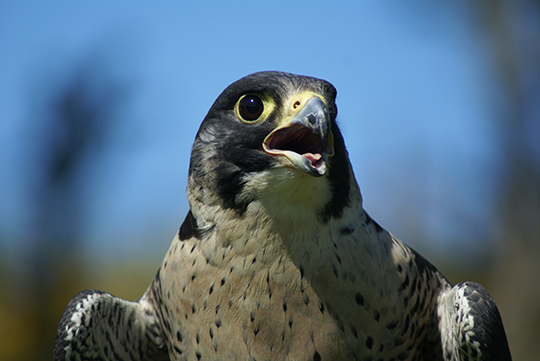The PSNI are using the latest technology to help prevent and combat wildlife crime.
Small Unmanned Aircraft (SUA), more commonly known as drones, have been used recently to monitor ‘hot-spot’ areas where crimes against birds of prey are occurring. This supports the work of officers in the districts, who investigate all instances of wildlife crime.
D/Inspector Stephen Brown said: “The PSNI’s Air Support Unit (ASU) provides aircraft to support a wide range of police activities throughout the Police Service of Northern Ireland, and as far as we are aware, the Police Service of Northern Ireland is thought to be one of the first Police Services in the UK to use this technology in this way.

“We are pleased to be able to effectively target hotspot areas and areas further afield as and when required so we can work with our partners in the hope that we can all prevent this type of crime and reach our ultimate goal to combat wildlife crime.”
Emma Meredith, PSNI Wildlife Liaison Officer, said: “The Police Service of Northern Ireland take all types of crimes seriously and this includes wildlife crime such as shooting, poisoning or trapping of birds of prey. On occasions, baits such as a rabbit carcass or sausages have been laid laced with poison in the public domain. On occasions these are seriously dangerous poisons such as Carbofuran which was banned across the EU in 2001.
“Be under no illusion that this type of poison (Carbofuran) is an indiscriminate killer and can also be fatal to humans, not only wildlife suffers but also any child, adult or pet could find and ultimately consume these poisoned baits.
“Given the potential dangers of this and other poisons, for the first time PSNI have begun to use the PSNI drones fitted with specialist cameras to assist in prevention and if possible catching the perpetrators, who if caught will be reported to the Public Prosecution Service. I would also ask if anyone find what they suspect to be a poisoned bait or suspicious dead bird to leave it in situ and call the police on 101.
“This is the first time in NI the drone has been used in wildlife crime and we are delighted the wildlife team, air support unit and external partners are working closely together to pilot this initiative.
“Following on from the launch of Operation Raptor in March 2016, the PSNI also contribute to a UK initiative named ‘Peregrine Watch’ and as part of this latest phase, we are using these drones. The ability to survey hard to reach areas mean that there is no hiding place for those who seek to persecute wild birds.”
The Northern Ireland Raptor Study Group (NIRSG) peregrine survey team who have been out monitoring with PSNI officers have welcomed the initiative saying: “We welcome the fantastic cutting-edge PSNI initiative using this technology locally especially since we lose a number of peregrines each year, particularly to illegal poisoning or shooting and trapping.
“The NIRSG volunteers are again spending time with local PSNI officers this year surveying peregrine sites, ringing chicks and liaising with landowners in order to raise the profile and prevent crimes against these birds. As always we would urge anybody who notices any suspicious activity particularly near quarries or cliffs to report these to the PSNI to help thwart these wildlife criminals”.
Dr. Jon Lees, Northern Ireland Environment Agency (NIEA) Wildlife Officer, said, “In Northern Ireland all nesting birds, their eggs and dependent young are protected by law from disturbance and destruction. Peregrines have increased in numbers since historic lows of the 1950-60’s caused by organochloride pesticides, egg collectors and persecution, however, they are still often targeted by those wanting to reduce their abundance, but can also be disturbed to the point of nest abandonment by people who just want closer look or a photograph.
“Any lawful operation that potentially impacts a protected species must be assessed by the NIEA. We may subsequently require the operator(s) to apply for a licence to conduct their business by a strict set of conditions or defer their activities to a less sensitive period.
“The NIEA have been working closely with the PSNI ASU, wildlife team and NIRSG to establish a safe working protocol to ensure that the Operation Raptor monitoring causes no harm. We would caution members of the public to avoid disturbing protected wildlife while flying drones or when taking photographs. Operators should contact the NIEA Wildlife Team 028 905 69551 for further advice”.
According to a report into the illegal killing of Northern Ireland’s native birds of prey, published by the Partnership for Action Against Wildlife Crime in November 2016, there were nine confirmed illegal poisoning or persecution incidents, affecting 11 protected birds of prey, in Northern Ireland in 2014. This report follows on from the 2009 – 2013 Persecution Report published in 2015.
Between 2009 and 2014 there are now a total of 44 confirmed reports of native birds of prey being illegally killed, plus one confirmed incident of illegal nest destruction. The report examined occurrence and trends in persecution of these birds, which has allowed PAW to produce ‘hot-spot’ maps to identify areas where crimes against birds of prey are occurring.
Of the nine confirmed cases in 2014, four of these occurred in County Down, two in County Tyrone and one in each of counties Londonderry, Armagh and Antrim. The report showed that the most frequent casualties were buzzards and the recently re-introduced red kite, with four of each of these species killed. Red kites and buzzards are particularly susceptible to poisoned baits as they will scavenge on carrion routinely. There were also two peregrine falcons and a sparrowhawk killed.
The PSNI take all reports of wildlife crime seriously and as such if we receive a report linked to Peregrine Watch we will respond accordingly.
If anyone has information on any type of crime against birds of prey please contact 101.
























